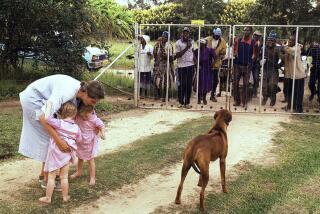Uprooted S. Africa Blacks to Regain Land
- Share via
JOHANNESBURG, South Africa — A community of 330 black families who were uprooted from their homes 3 1/2 years ago in an effort to make a South African rural area all-white won government agreement Monday to let them resettle on farmland near their old village in western Transvaal province.
Gerrit Viljoen, the government minister in charge of black affairs, announced in Cape Town that suitable land will be purchased for the Mogopa community by the end of the year and that the South African citizenship of the community’s 3,000 residents, in doubt since they were moved, will be guaranteed.
The agreement, if carried out as expected, would not only bring to an end lengthy efforts to move the Mogopa residents and to their strenuous fight against it. But the decision could also be the end of the whole resettlement program, with its transfer of blacks from areas designated for whites into tribal homelands.
“Mogopa had become a test case--both for those communities facing resettlement and for those already removed but seeking to return to their original homes--and its victory will encourage others,” Nicholas Haysom, a lawyer who has advised the Mogopa residents in their struggle, said Monday.
“The final agreement still has to be negotiated. Many questions are not resolved, and there are still areas of dispute. . . . Yet we can see that the terms of this agreement, if honored as we expect, could be very significant in the whole South African context.”
The agreement’s importance was enhanced by the direct negotiations over the weekend between Viljoen, who as the minister of education and development assistance is broadly in charge of black affairs, and Mogopa leaders. These were rare, face-to-face talks between officials of the white-led minority government and elected black leaders with a community mandate to negotiate.
“They were impressed with one another,” an observer at the talks said later. “Viljoen seemed quite moved by the sincerity, the determination and the good will of the Mogopa leaders, and they in turn were touched by his willingness to listen and his quite evident concern about their situation. . . .
“While projections of which of our broader problems can be settled by negotiations now are still difficult, you can see many other issues that, given determination and good will, could be resolved this way. And that is hopeful. That is good news.”
Viljoen agreed in the talks that the land purchased, probably from some of the white farmers in western Transvaal who had demanded the removal of Mogopa and other “black spots,” would be given to the community as “freehold” property, and that it would not be incorporated into Bophuthatswana or another tribal homeland.
These provisions, along with the guarantee of continued South African citizenship, represent a substantial victory for the Mogopa residents--and appear to reflect a strong government desire to end the often bitter dispute over its controversial resettlement program and to move toward a negotiated resolution of the country’s prolonged political crisis.
The Mogopa case was particularly sad, even in South Africa, where the tragic has become almost commonplace. A thriving farming community of almost 80 years, a model in rural development, Mogopa was evacuated at gunpoint in February, 1984, then bulldozed into grazing land for cattle as part of the South African government’s determination to remove “black spots” from regions designated as white farming areas.
The residents were to be compensated for their land and resettled in the Tswana tribal homeland of Bophuthatswana, but they found the new land inferior, the living conditions difficult and the loss of their South African citizenship intolerable.
The South African appeals court held later that they had been removed from their land illegally, but the government rebuffed their attempts to return home. The government also recently blocked an effort to buy an unworked farm, owned by the Lutheran Church, and instead expropriated it for an agricultural school.
The Mogopa community, nearly destitute after three years as refugees, angry over the poor living conditions in a squatter camp and anxious to force the government to respond to their demands, had threatened to return this weekend to the original village, though it would have meant a confrontation with the police and army.
More to Read
Sign up for Essential California
The most important California stories and recommendations in your inbox every morning.
You may occasionally receive promotional content from the Los Angeles Times.










